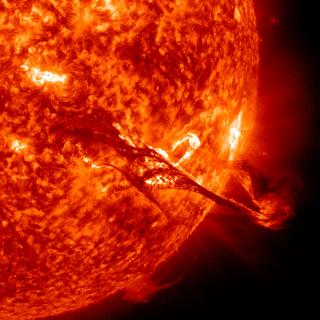Bibcode
Benko, M.; Balthasar, H.; Gömöry, P.; Kuckein, C.; González Manrique, S. J.
Bibliographical reference
Astronomy and Astrophysics
Advertised on:
6
2024
Journal
Citations
0
Refereed citations
0
Description
Context. The physical parameters of the sunspot are not fully understood, especially the height dependence of the magnetic field. So far, it is also an open question as to which heights the He I 10 830 Å spectral line is formed at.
Aims: Our aim is to investigate the magnetic and dynamical properties in the atmosphere above a sunspot, from the photosphere to the chromosphere. We analyzed the photospheric and chromospheric magnetic field properties of a stable sunspot in AR 12553 on June 20, 2016 using spectropolarimetric observations obtained with the GREGOR Infrared Spectrograph (GRIS) at the 1.5-meter GREGOR telescope.
Methods: A spectral-line inversion technique was used to infer the magnetic field vector and Doppler velocities from the full Stokes profiles. In total, three spectral lines were inverted and the variation of the magnetic properties was qualified using the average values of the radial circles. The sunspot is located close to the solar limb, and thus this allows us to make a geometrical determination of the height of the spectral line He I 10 830 Å.
Results: We find the height of helium spectral line to be 970 km above the photospheric spectral lines directly from observation at a stable sunspot. The total magnetic field strength decreases with height over the sunspot; the rates are −0.34 G km−1 for the umbra and −0.28 G km−1 for the penumbra. The inclination increases with increasing height in the umbra, but decreases in the penumbra. In the umbra, the vertical component (Bz) decreases with height, while the horizontal component (Bhor) remains almost constant. In the penumbra this is reversed, as Bz remains nearly constant over height, while Bhor decreases. We also observe fast velocities with 30 km s−1 in small chromospheric patches on the central side of the spot.
Conclusions: The key parameters depending on height in the sunspot are the Bz component of the magnetic field for the umbra and the Bhor component of the magnetic field for the penumbra. The observation revealed supersonic downward velocities in and near the outer penumbra.
Aims: Our aim is to investigate the magnetic and dynamical properties in the atmosphere above a sunspot, from the photosphere to the chromosphere. We analyzed the photospheric and chromospheric magnetic field properties of a stable sunspot in AR 12553 on June 20, 2016 using spectropolarimetric observations obtained with the GREGOR Infrared Spectrograph (GRIS) at the 1.5-meter GREGOR telescope.
Methods: A spectral-line inversion technique was used to infer the magnetic field vector and Doppler velocities from the full Stokes profiles. In total, three spectral lines were inverted and the variation of the magnetic properties was qualified using the average values of the radial circles. The sunspot is located close to the solar limb, and thus this allows us to make a geometrical determination of the height of the spectral line He I 10 830 Å.
Results: We find the height of helium spectral line to be 970 km above the photospheric spectral lines directly from observation at a stable sunspot. The total magnetic field strength decreases with height over the sunspot; the rates are −0.34 G km−1 for the umbra and −0.28 G km−1 for the penumbra. The inclination increases with increasing height in the umbra, but decreases in the penumbra. In the umbra, the vertical component (Bz) decreases with height, while the horizontal component (Bhor) remains almost constant. In the penumbra this is reversed, as Bz remains nearly constant over height, while Bhor decreases. We also observe fast velocities with 30 km s−1 in small chromospheric patches on the central side of the spot.
Conclusions: The key parameters depending on height in the sunspot are the Bz component of the magnetic field for the umbra and the Bhor component of the magnetic field for the penumbra. The observation revealed supersonic downward velocities in and near the outer penumbra.
Related projects

Solar and Stellar Magnetism
Magnetic fields are at the base of star formation and stellar structure and evolution. When stars are born, magnetic fields brake the rotation during the collapse of the mollecular cloud. In the end of the life of a star, magnetic fields can play a key role in the form of the strong winds that lead to the last stages of stellar evolution. During
Carlos Cristo
Quintero Noda